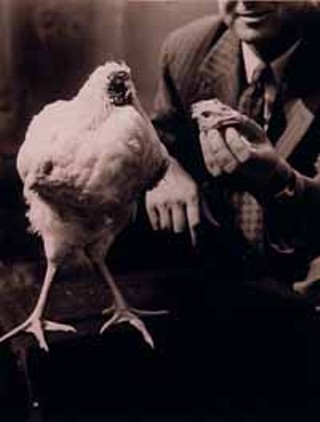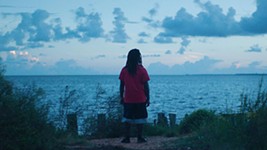Chick Flick
Texas Documentary Tour: Mark Lewis and 'The Natural History of the Chicken'
By Anne S. Lewis, Fri., April 6, 2001

And now for something completely different: The Natural History of the Chicken. Nope, not something from National Geographic, the Discovery Channel, or Monty Python. Aussie filmmaker Mark Lewis -- the guy who gave us everyone's fave Cane Toads (1988), about that reptilian biological control gone awry, and Rat (1998) -- now takes a hilarious, dark, totally fresh look at another subject to which we pay scant attention (unless asked "White or dark?") -- our relationship with the chicken.
Turns out there are some out there who take their chickens very seriously. We might have guessed that somewhere in the ether -- West Palm Beach, perhaps -- there might be a woman who treats her pet rooster like a poodle: grooming and blow-drying its feathers, carrying it in her purse while shopping, swimming with it in her pool, feeding it Big Macs, and setting it in front of the TV for its opera fix.
But who amongst ye could have conjured Mainer Janet Bonney's true chicken story? When calling in her flock to shelter before a blizzard one day, Bonney discovers that one of them -- No. 7 -- is unaccounted for. Later, to her horror, she finds No. 7 belly-up, chicken legs extended in rigor mortis, apparently frozen to death under the front porch. She brings the "dead" chicken (whom she subsequently names Valerie) into the house and sets her down, to be disposed of later. But later, she detects a faint heartbeat and comes to wonder whether Valerie might still be alive after all. Bonney does what any devoted chicken owner would do: She administers mouth-to-beak resuscitation. Valerie's recovery makes headlines -- a nice counterpoint to news of the O.J. trial that was going on at the same time. Bonney later brings in an animal communicator to interrogate Valerie about her near-death experience.
Then there's the tale of "Miracle Mike," the Colorado rooster who, in the Forties, had his head chopped off -- and survived! Owner Mike Olsen fed his decapitated rooster with an eye dropper through his esophagus. Then, predictably, Olsen began to see dollar signs in his rooster's miraculous survival -- why, he could take "Miracle Mike" on the freak show road and finally pay off the farm. For two and a half years, over the protests of animal activists, Olsen came close to doing just that, until fate intervened.
Woven into the re-enacted vignettes of "valued" fowl like Valerie and Miracle Mike are the "meanwhile, back at the chicken factory" scenes which illustrate the more typical fate of today's chicken and its inexorable march from egg hatchery to grow-out farm to processing plant to dinner table. Did you know that if laid head to claw, KFC chickens consumed worldwide would stretch some 284,000 miles? They would circle the earth at the equator 11 times or stretch from the earth approximately 59,000 miles past the moon.
Mark Lewis, who lives in L.A., dedicates his film (which showed at Sundance this year) to the Italian Renaissance natural historian Ulisse Aldrovandi, who saw the chicken as part of a much larger order of things. After viewing The Natural History of the Chicken -- especially, the hilarious story of what happens when one neighbor in a quiet, rural/residential area in Ohio decides to exercise his God-given right to raise fighting roosters -- you begin to get the big picture.
Austin Chronicle: Your first film, Cane Toads, was a funny, serious look at a biological control gone wrong in Australia in the Thirties. [The toad was introduced in Australia to counteract a beetle destroying the sugar cane crop. It prospered and beat the beetle, but it also ate everything else, devastating the local fauna.] Why all the animal subjects for your films?
Mark Lewis: Cane Toads went extremely well theatrically and as a broadcast television release, so it became my burden that people wanted funny, irreverent documentaries from me. After Cane Toads, I made a series of films about animals and some not about animals, but I'm probably better known for the animal films. The truth is, I'm not really a big-time animal person -- I don't go ga-ga over animals or have lots of them running all over the house. I just find that animals -- or the animal-human connection -- is a great vehicle for finding funny, entertaining, comedic stories. But I don't want to sound slight either. These stories have a message or a theme or something to say about mankind as well, of course.

AC: And why a chicken film?
ML: I grew up with chickens. I think they're exceptional animals. The problem is they carry a lot of baggage, because it's been imprinted on us that they're a worthless animal, which, of course, suits the interests of the commercial chicken industry. But all the research about chickens pointed to the exact opposite, this being my experience with every subject I've gotten into. I take delight in exploring obvious or taken-for-granted or boring subjects, and chickens are representative of that. No one would think of doing a film about a chicken. It was a challenge; that's why I wanted to do it.
The idea of exploring the "natural history" of the chicken was partly ironic, but what I meant by that is that just because an animal is domesticated doesn't mean that it gives up having a natural history. The "natural history" of a chicken living with a lady in West Palm Beach is as valid as a chicken living in a cage in a production facility and as valid as one living in idyllic circumstances on a farm. What I tried to say in the film was these are all different sorts of natural histories; these are the ways that man has used and abused and utilized chickens for his own needs -- whether as a pet or for food.
AC: Your style of documentary -- narrative-driven, whimsical, making generous use of re-enactments -- is quite distinctive. Can you talk a bit about that?
ML: I like to think I'm a filmmaker, and as a filmmaker I have all these elements at my disposal to bring to the making of these films. I like using them. Unfortunately, for a lot of documentaries, you don't have to be a filmmaker to make one -- the craft of filmmaking is being totally lost in documentary in many, many cases because of the new digital cameras, for one reason. A lot of people think just recording things is enough. That's fine and valid, but I like to think of myself as a filmmaker who makes documentaries.
AC: What is your definition of a documentary?
ML: My definition of a documentary is that ... a documentary can be anything. To my mind what makes documentaries so gloriously wonderful is that they can be all drama; they can have actors; they can have vérité; they can have an eight-year-old holding a mini-DV camera; they can be animation; they can be experimental, personal, narrative. The beauty of documentary is that it's so hard to define. Now, there are documentary purists out there who think documentary must be of a type -- it must be worthy, or well-meaning, or tell us something incredibly amazing about man's injustice to man. Bollocks, total bollocks! Documentary is there to entertain as much as any other form. I think a lot of documentarians are total idiots who think that all documentary requires is a weighty, well-meaning subject and that's a documentary. That's crap. What many documentarians need to do is work at how to entertain an audience, and then they'll have an audience to show their films to.
AC: You also make liberal use of re-enactments in your films.
ML: You know, documentary started with people filming re-enactments. If any of those purists wants to learn about the history of documentary, they'll discover that. When the early documentarians went out making films, they asked the Eskimo to throw a spear at the seal -- that was a re-enactment! So to suggest that re-enactments don't have a place in documentaries is rubbish! They don't have to be called re-enactments -- they can be called dramatic restagings, dramas, any number of things. But to film a re-enactment does not dilute the fact that something actually occurred. Filming a re-enactment of someone giving mouth-to-beak resuscitation to a chicken does not violate the fact that someone did that -- the only difference was that no one was around with a camera to record it.
AC: How on earth do you uncover the real-life stories that you include in your films?
ML: Longtime research. ![]()
The Natural History of the Chicken will be presented as part of the Texas Documentary Tour on Wednesday, April 11, 7:30pm, at the Alamo Drafthouse, 409 Colorado. Filmmaker Mark Lewis will introduce the film and conduct a Q&A session following the screening. Advance tickets are available for Austin Film Society members only by calling 322-0145. Tickets will go on sale at 6:15pm on the day of the show. Admission prices are $6 per show for the general public; $4 for Austin Film Society and KLRU members and students.The Texas Documentary Tour is a co-presentation of the Austin Film Society, the University of Texas RTF Dept., The Austin Chronicle, KLRU-TV, and SXSW Film.










